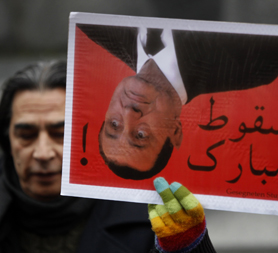Obama in talks to force immediate Mubarak resignation
Barack Obama launches “the biggest gamble of his presidency so far” as he seeks to manoeuvre an “elegant” but quick way for Egypt’s President Mubarak to leave office, says Sarah Smith.

The Obama Administration is believed to be mooting the formation of an interim Egyptian Government, under the Vice-President, Omar Suleiman, which could prepare the country for free and fair elections later this year, the New York Times reports.
One of the options being discussed is the creation of a military-backed caretaker government; the talks come against a backdrop of anti-Mubarak protests escalating in the streets of Cairo and other Egyptian cities.
The paper added that the US is also proposing that the transitional government invite members from the whole gamut of opposition groups, including the Muslim Brotherhood, with a view to bring about free and fair elections in September.
Obama’s gamble
But our Washington Correspondent Sarah Smith told Channel 4 News that the Obama Administration did not want any plan to be credited to the United States.
“They know that if any solution has ‘Made in America’ stamped on it it will not have any credibility inside Egypt,” she said.
So the US wanted an “elegant” – but quick – way for Mubarak to leave office, with a stable structure to be left in place pending free elections – when the United States would have to be very “hands-off”.
“And that is where it is a very difficult gamble for Obama here,” she added. “If it is a Government that comes in – elected – but less friendly to America – openly hostile to America – then he will get the blame for that, as he will if it is a Government that comes in that is hostile towards Israel.
“So this really is a very big gamble – the biggest gamble of his presidency so far.”
In an interview with NBC on Thursday night, President Mubarak, 82, said that, while he was fed up and wanted to resign, he would refrain from doing so out of fear that the country would descend into chaos.
He said he was very unhappy about the two days of clashes in Tahrir Square. Organisers of the protesters trying to topple the regime of Mubarak have called on their supporters to fill every square in the capital on Friday – in what the crowd dubbed the ‘Friday of Departure’ – in the wake of two days of street battles between the pro and anti government camps.
Ten people were reportedly killed and 800 injured on Thursday in the Square, after the Mubarak’s supporters attacked the protesters.
Defence minister Tantawi and other top army officials are visiting Tahrir Square.
On Thursday, gangs of Mubarak loyalists attacked journalists and human rights activists as government opponents pushed supporters out of Cairo’s main square.
The new Vice President, Omar Suleiman, widely considered the first successor Mubarak has ever designated, fuelled anti-foreign sentiment by going on state television and blaming outsiders for inflaming unrest.
The government has accused media outlets of being sympathetic to protesters who want the President to quit now rather than serve out his term, as he has vowed to do.
Earlier, the UN Secretary-General, Ban Ki-moon, called for an immediate end to “the intimidation and restrictions on the international media and human rights groups” in Egypt’s current turmoil, describing it as “outrageous.”
“We have seen that there were many world leaders who have been expressing their concerns and very genuine advice, sincere advice, to the Egyptian authorities to make the necessary reforms reflecting the genuine wishes and concerns expressed so far by the people,” he said.
Meanwhile, Prime Minister David Cameron warned on Friday: “If we see on the streets of Cairo today state-sponsored violence by thugs hired to beat up protesters, the regime will lose any remaining credibility it has in the eyes of the watching world, including Britain.
“We have been clear that Egypt should be taking steps to show there is a clear, credible transparent path towards transition.
“So far the steps taken have not met the hopes of the people. EU leaders today have to come together to show they support that orderly transition.”
Berlusconi: ‘Mubarak the wise’
By contrast, embatled Italian Prime Minister Silvio Berlusconi, speaking in Brussels, praised Egyptian President Hosni Mubarak as a “wise man” and said he should remain in place during the country’s transition to democracy.
“I hope there can be continuity in government. I hope that in Egypt there can be a transition toward a more democratic system without a break from President Mubarak, who in the West, above all in the United States, is considered the wisest of men and a precise reference point.”